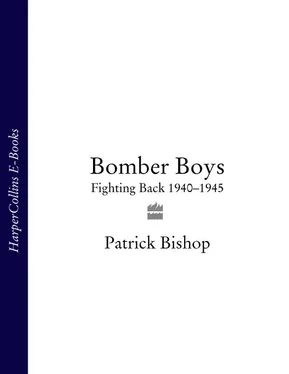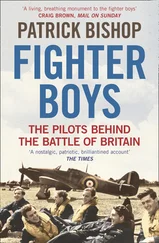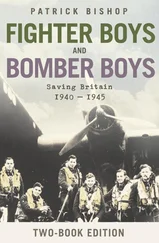The decision to fight was made easier by the seeming inevitability of the conflict. The Germans had left Britain with no choice. To the older airmen, this came as no surprise. Peter Johnson, who was nearly five when the first war broke out and whose naval officer father was killed in 1914, felt that ‘mass hatred … was inoculated into my generation against the Germans’. 11He was at least ten years older than most of his comrades in Bomber Command. The writings and recollections of the younger men do not reveal much evidence of instinctive loathing for the Hun.
A surprising number of them had some direct or indirect contact with events in Germany. When he was about fourteen, Ken Newman made friends with a German boy called Erich Strauss who had come from Stuttgart to visit his grandmother. ‘It was during one of our walks around Mitcham Common that he told me he and his family were Jewish and that the Jews in Germany were being given a very hard time by the Nazis,’ he wrote. ‘I was not quite sure whether he was telling the truth or was exaggerating to impress me.’ In 1938 he visited Germany with a school party, travelling by boat and train to Cologne then sailing up the Rhine to Mainz, staying in youth hostels along the way. ‘In every one were parties of Hitler Youth who marched about in military-style uniforms, and every morning and evening attended a flag raising or lowering ceremony with arms raised and shouts of “Heil Hitler!”’ Even so, they seemed friendly enough to the English visitors. Every young person he met ‘repeated again and again that the last thing they wanted was another war with Britain and France.’ 12
Informal attempts had been made to forge friendly links with Germany in the years between the wars through school trips and exchanges. Sometimes they were too successful. In the spring of 1936 thirteen-year-old Ken Goodchild went on a visit with some schoolmates from No. 6 Central School in Morden, Surrey. They were in the Rhineland when the Germany army marched in, and visited Cologne, which he was to pass through seven years later as a prisoner. On their return their families were surprised to see they were wearing swastika lapel badges. In 1937 Ken went again and was present in Düsseldorf when Hitler arrived to open an exhibition. The Führer exchanged some friendly words with the master accompanying the boys and patted some of them on the head. Goodchild was perhaps the only Bomber Command airman to have stared the enemy leader in the face. 13
In the same year, Leonard Cheshire, a restless, rather wayward eighteen-year-old, who had just left Stowe public school, went to stay with a German family in Potsdam before he went up to Oxford. The head of the household was a retired admiral called Ludwig von Reuter. He was not a supporter of the Nazis but shared some of their opinions, telling Cheshire that 95 per cent of humanity were worthless and war was a valuable means of keeping them down. Cheshire went on to become one of the most dedicated and ruthless pilots in Bomber Command. 14
Before the war it was still possible to differentiate between Nazis and ‘decent’ Germans. ‘How I loathed the Nazis,’ wrote Guy Gibson. ‘How could the common people of Germany allow such a world-conquering crowd of gangsters to get into power and stay in power? Ruthless and swaggering, domineering brutality, that was their creed.’ His anger was directed with almost equal vigour against British politicians, the ‘rotten Governments, the Yes men and the appeasers’ as well as those who voted for them.
Gibson blamed the older generation for allowing another war to happen. But he was also concerned about the willingness of his contemporaries to fight it. On 1 September 1939, having been called back from leave to rejoin his squadron, he passed through Oxford with his friend Freddy Bilbey who had been studying biology there. After a lengthy session in a pub they went to have dinner. ‘It was fairly late and we were pretty hungry, and fed like kings with some excellent 1928 burgundy, but what a rotten crowd to be seen at that place – drunken, long-haired, pansy-looking youths, mixed with foppish women. They so disgusted me that I asked Freddy if they were undergraduates … “Good Lord, no!” he said. “They are the types who try to look like undergraduates.”’ 15
Gibson’s doubts about some ‘varsity men may have stemmed from the Oxford Union debate of a few years before in which the motion that the house would not fight for King and Country had been carried. The event had been treated as if it was a genuine barometer of young, privileged opinion. It turned out to be utterly misleading.
Robert Kee, a handsome, rather bohemian history undergraduate, might possibly have attracted a suspicious glare from Gibson had he encountered him in an Oxford pub. But Kee was as contemptuous as Gibson was of the appeasers and as eager to get to grips with the Nazis. ‘At the time of Munich all of us at Oxford hated what was going on,’ he said. ‘We all thought [the politicians] were doing exactly what the Nazis wanted them to.’ He was in France with his tutor A. J. P. Taylor when war was declared and rushed back to sign up for the RAF. 16
Whatever subtleties of feeling might have existed towards the Germans in 1939 faded with the end of the phoney war, and they became, simply, the enemy. Soon they were all too visible, in the skies over Britain. The Battle of Britain provided the most effective recruiting sergeant the RAF could have hoped for. Michael Beetham was a seventeen-year-old schoolboy in the summer of 1940. At the start of the holidays he went to stay with his father, a company commander with the York and Lancaster Regiment then based on the hills just outside Portsmouth at Hillsea barracks. ‘It was a lovely summer and the Battle of Britain was just beginning with the German bombers bombing Portsmouth naval base,’ he said. ‘God, it was spectacular. We went outside and saw the bombers going in and the Hurricanes and Spitfires diving in and having a go at them. I said to my father, that’s what I want to do. He obviously wanted me to join the army. I couldn’t put my name down until I was eighteen but I did it as soon as I could. I joined the air force to be a pilot. I’d never flown in my life but I wanted to do what those chaps were doing.’ 17At the same time Edward Hearn, a young estate manager, was watching dogfights in the skies over his home in Folkestone, Kent. ‘I thought at that time that if I’ve got to go to war then I’ll go in an aircraft.’ He decided to keep his decision from his parents in order not to add to their burden of worry. All his siblings were in the process of joining up. He signed on in Maidstone. ‘When I got back my mother said why aren’t you at work? I told her, and she said well, I suppose it had to happen sooner or later.’ Eddie ended up a member of the crew of Michael Beetham, 50 Squadron’s bombing leader.
Bruce Lewis was standing with his friends outside the tuck shop during mid-morning break at Dauntsey’s School in Wiltshire when ‘we heard the grinding growl of unsynchronized German aero-engines … the Battle of Britain was at its height and schoolboys knew all about these technical matters. The twin-engine Luftwaffe bomber flew low over the school, and then, thrill of thrills, came the shapely little Spitfire in hot pursuit, the distinctive whistle from its Merlin engine sounding almost like the wind itself.’ Later they heard the bomber had been shot down. Amazingly, the victorious fighter pilot was an old boy of the school, Eric Marrs, who destroyed six German aircraft before being killed the following year.
At that moment Lewis jilted the Royal Navy, his first preference, and chose the RAF. It was two years before he could join up. He had a talent for drama and got a job as a radio actor with the BBC. His father, a professor who had been badly wounded at the Somme, wanted him to go to university which would gain him exemption from war service for three years. To Bruce, ‘such an existence would have been impossible – to sit studying in complete safety while others of my age were dying for their country was not on.’ 18
Читать дальше












